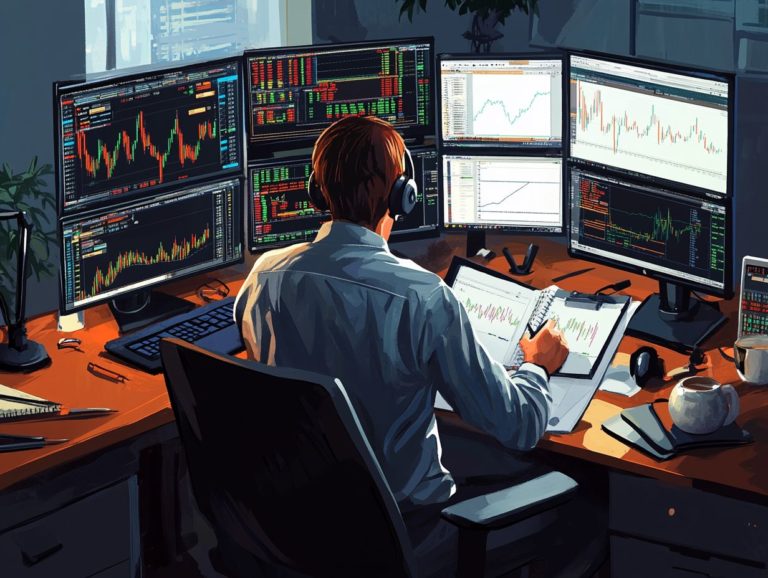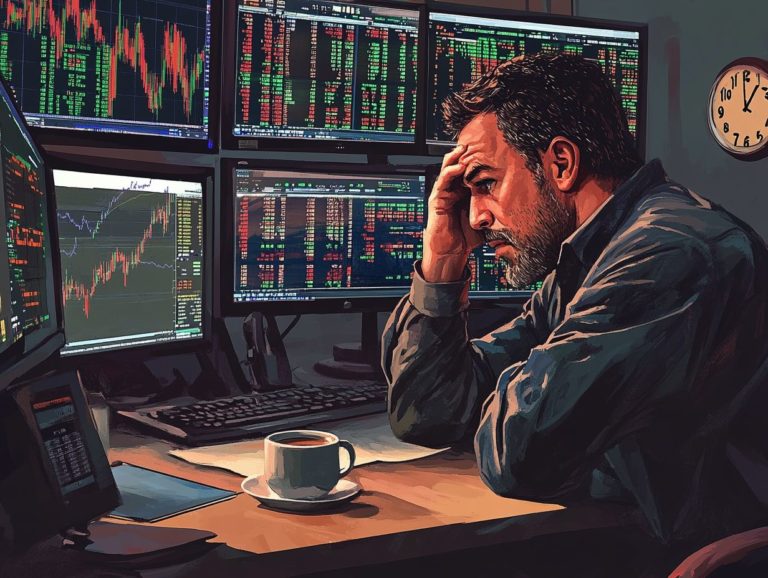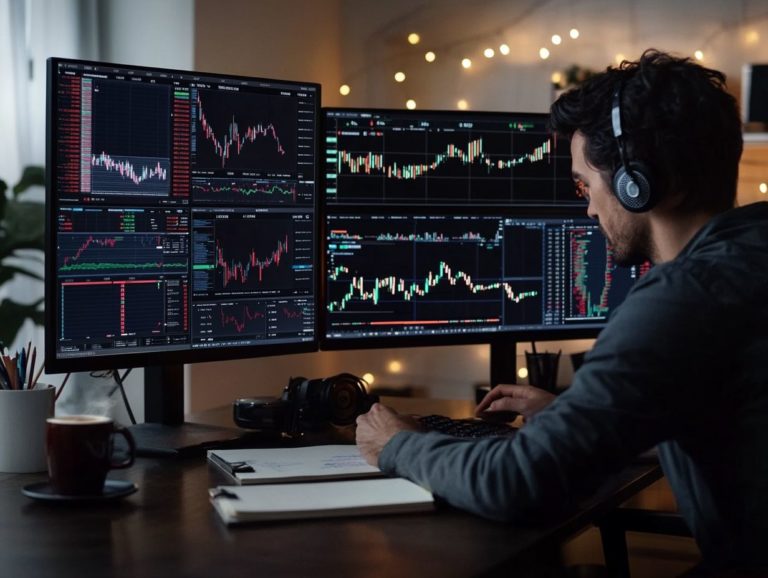Understanding Fear and Greed in Trading
Emotions hold a pivotal position in trading, often guiding decisions more than market analysis or strategy ever could.
Fear and greed emerge as the two dominant forces, capable of steering you toward remarkable gains or significant losses. Grasping how these emotions shape your actions is essential for any trader.
This article delves into the impact of fear on decision-making, the seductive pull of greed, and effective strategies for managing these powerful feelings.
By fostering emotional discipline, you can maintain a balanced mindset, allowing you to navigate the markets with greater confidence and poise.
Contents
- What You Should Remember:
- The Role of Emotions in Trading
- The Impact of Fear on Trading
- The Influence of Greed on Trading
- Recognizing and Managing Greed
- Strategies for Overcoming Fear and Greed
- The Importance of Emotional Discipline in Trading
- Frequently Asked Questions
- What is the concept of Fear and Greed in Trading?
- How do Fear and Greed impact trading decisions?
- What are the consequences of being controlled by Fear and Greed in trading?
- How can one overcome Fear and Greed in trading?
- Can Fear and Greed be beneficial in trading?
- Are there any warning signs to look out for when it comes to Fear and Greed in trading?
What You Should Remember:
- Emotions play a crucial role in trading; understanding fear and greed is essential for success.
- Fear leads to impulsive and irrational decisions, causing traders to miss opportunities or make harmful trades.
- Greed can cause traders to take excessive risks and become emotionally attached to their trades, resulting in losses. Recognizing and managing greed is crucial in trading.
The Role of Emotions in Trading
The role of emotions in trading is crucial and profoundly shapes your decisions as a financial trader. Cultivating emotional awareness is essential for navigating the stock market, as feelings such as fear and greed can drive you toward irrational investment choices.
Understanding how market sentiment and trading psychology affect your strategies is vital for thorough risk assessment and enhancing your market performance. Acknowledging the emotional extremes that frequently steer market trends helps you craft trading plans that harness these emotions for better results!
Understanding Fear and Greed
Understanding fear and greed is essential for grasping their profound influence on market psychology and investor sentiment. These two powerful emotions shape investor behavior, creating a landscape where decisions are often more impulsive than rational.
The fear and greed index acts as a vital barometer of market mood, offering critical insights into whether investors are caught in a wave of excessive optimism or deep pessimism. When emotions reach their extremes, they can spark significant price movements; overwhelming fear may trigger a cascade of panic selling, while unchecked greed can inflate valuations to unsustainable levels.
This emotional rollercoaster doesn’t just affect individual stocks; it also contributes to overall market volatility, propelling momentum as traders react to perceived trends.
The Impact of Fear on Trading
The influence of fear on trading can result in notable shifts in market behavior, shaping your decisions as a financial trader when it comes to buying and selling financial instruments.
How Fear Can Affect Decision Making
Fear significantly influences your decision-making as a trader, often resulting in panic selling and a detrimental shift in sentiment. This emotional response creates a ripple effect in the market, where widespread anxiety fosters a herd mentality, prompting more traders to liquidate their holdings.
The psychological mechanisms involved such as loss aversion (the tendency to avoid losing money rather than focusing on making money) and the fear of missing out can cloud your judgment, overshadowing rational analysis and leading to impulsive choices that heighten market volatility.
When fear seeps into the trading environment, even fundamentally strong stocks can face sharp declines, as traders react not only to their perceptions but also to the prevailing mood of uncertainty that envelops the broader market.
The Influence of Greed on Trading
The influence of greed on trading behavior reveals itself through elevated market sentiment, often resulting in considerable fluctuations in stock price strength and trading volume. This dynamic interplay shapes your investment decisions and ultimately impacts your portfolio’s performance.
Start mastering your emotions today to transform your trading success!
Recognizing and Managing Greed
Recognizing and managing greed is vital for you as a trader if you aspire to achieve sustainable success in your trading strategies.
Understanding the reasons behind strong feelings will help you maintain a balanced outlook. Stay vigilant for market signals that might indicate overconfidence, like rapid price surges without solid supporting data.
Cultivating an awareness of the potential for emotional extremes is crucial, as these can lead to impulsive decisions. By employing techniques like setting clear profit targets and sticking to predetermined risk levels, you can effectively reduce the negative effects of greed.
Ultimately, fostering investor confidence and maintaining a stable market mood is essential. This approach helps keep emotional ups and downs in check, enabling you to adopt a more systematic and strategic trading style.
Strategies for Overcoming Fear and Greed
Developing strategies to conquer fear and greed is essential for you as a trader striving for emotional discipline and consistent success in the markets.
Mastering these emotions positions you to make informed decisions and significantly enhance your trading performance.
Techniques for Controlling Emotions
Techniques for controlling emotions in trading are crucial for maintaining emotional discipline and reducing the effects of market ups and downs.
As a successful trader, you recognize that mastering emotional control and effective risk assessment is vital. Start by setting clear trading plans that outline specific entry and exit points. This creates stability and helps you avoid impulsive decisions driven by fear or greed.
Regularly reviewing your past trades can also reveal your emotional triggers and reinforce disciplined practices. Incorporating mindfulness techniques like meditation or breathing exercises helps you manage your reactions during stressful market moments.
By embracing these strategies, you not only strengthen your emotional resilience but also enhance your overall trading strategy and financial outcomes.
The Importance of Emotional Discipline in Trading
Emotional discipline is crucial for your trading success! Master it to change your game. It serves as a foundational pillar of trading psychology that profoundly impacts your behavior and the overall trading volume in the market.
Mastering this discipline can be the difference between success and failure, guiding your decisions with clarity and resilience.
Maintaining a Balanced Mindset
Maintaining a balanced mindset is crucial for you as a trader, especially when navigating the complex world of trading psychology and its impact on your investment decisions.
Achieving this balance involves using various techniques, such as mindfulness practices and regular self-reflection. These can help you stay grounded amid market fluctuations. By cultivating emotional awareness, you ll be better equipped to recognize how fear or greed can cloud your judgment.
A balanced mindset enables you to interpret market conditions with greater clarity, making it easier to assess stock prices without being swayed by fleeting trends.
Ultimately, this clarity supports more rational investment decisions, boosting your confidence and paving the way for long-term success in the ever-evolving trading landscape.
Frequently Asked Questions
What is the concept of Fear and Greed in Trading?
Fear and Greed are two powerful emotions that drive the behavior of traders in the financial markets. Fear refers to the worry about losing money, while Greed refers to the desire for more profits. Understanding the relationship between trading and emotions is crucial for success in the market.
How do Fear and Greed impact trading decisions?
Fear and Greed can heavily influence traders decisions, causing impulsive and irrational choices. Fear may urge traders to sell their assets too early, while Greed may lead them to hold on to their investments for too long, missing out on potential profits.
What are the consequences of being controlled by Fear and Greed in trading?
Fear and Greed can harm traders. They can lead to missed opportunities, losses, emotional distress, and burnout.
It’s essential to manage these feelings and make decisions based on market analysis.
How can one overcome Fear and Greed in trading?
Developing a solid trading plan can help you beat Fear and Greed. A plan keeps you focused on long-term goals and reduces decisions based on feelings.
Practicing mindfulness and self-awareness also helps in managing these emotions.
Can Fear and Greed be beneficial in trading?
A small amount of Fear and Greed can actually motivate traders. However, keeping these emotions under control is crucial to prevent poor judgment.
Are there any warning signs to look out for when it comes to Fear and Greed in trading?
Yes, you should watch for impulsive decisions and constant checking of market prices. Extreme emotions like panic or euphoria are also red flags.
Recognizing these signs allows you to step back and reassess your mindset before jumping into decisions.






